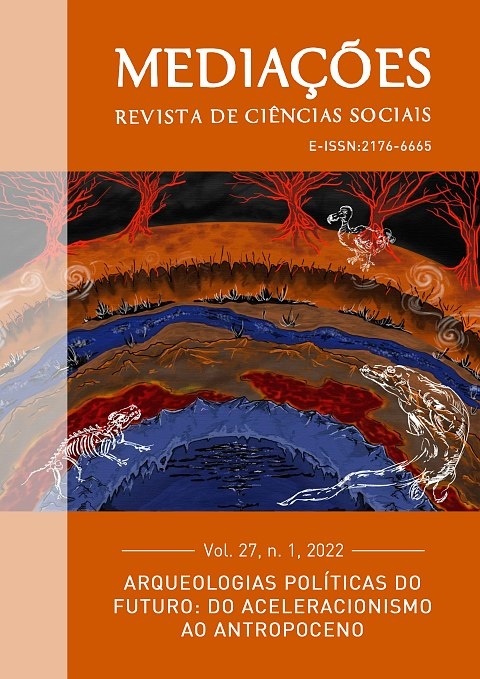Negentropy, future and power: traces to think political transformation in the technocene
DOI:
https://doi.org/10.5433/2176-6665.2022v27n1e45045Keywords:
Negentropy, Governmentality, Algorithms.Abstract
In this article, starting from the philosophical framework developed by Bernard Stiegler - in coordination with other authors and traditions - we provide a set of keys that we consider essentials to account for the present and to glimpse into possible futures. We start from the entropy/negentropy dichotomy to recognize and project bifurcations in a system that tends to closure, enabling us to find and trace paths capable of escaping from mere becoming. On that basis, we discuss the apparent symmetry that seems to emerge from the Stieglerian periodization of proletarianization in favor of recognizing the radical novelty of digital expansion; we also address the implications of this novelty when it comes to thematizing power relations. On the other hand, we analyze the potentiality of the pharmacological and organological perspective around the digital in order to, finally, advance in the reflection on the possibilities of building futures - inherently negentropic -, from the point of view of the commitment to an algorithmic politics based on some new principles.Downloads
References
BRATTON, Benjamin. La terraformación: programa para el diseño de una planetariedad viable. Buenos Aires: Caja Negra, 2021.
BRUNO, Fernanda. Racionalidad algorítmica y subjetividades maquínicas: pensar con el Sur. Conferencia dictada en la Escuela de Diseño, Universidad Católica de Chile. 31 ago. 2021. Disponible en: https://m-partners.facebook.com/escueladisenouc/videos/racionalidad-algor%C3%ADtmica-y-subjetividades-maqu%C3%ADnicas-pensar-con-el-sur/364503188554460/?m_entstream_source=video_home&player_suborigin=feed&player_format=permalink. Acceso en: 14 abr.2022.
COSTA, Flavia. La pandemia como "accidente normal". Revista Anfibia, 23 abr. 2020. Disponible en: http://revistaanfibia.com/ensayo/ la-pandemia-accidente-normal/. Acceso en: 29 marzo 2022.
COSTA, Flavia. Tecnoceno: algoritmos, biohackers y nuevas formas de vida. Buenos Aires: Taurus, 2021.
CRUTZEN, Paul. J. Geology of mankind: the antropocene. Nature, v. 415, n. 23, enero 2002.
CRUTZEN, Paul. J.; STOERMER, Eugene. F. The anthropocene. Global Change Newsletter, [S. l.], n. 41, p. 17-18, 2000.
DEAN, Michael. The Constitution of Poverty: Toward a Genealogy of Liberal Governance. New York: Routledge, 1991.
FLORIDI, Luciano. The 4th revolution: how the infosphere is reshaping human reality. Oxford: University Press, 2014.
FOUCAULT, Michel. Nacimiento de la biopolítica: curso en el collège de France, 1978-1979. Buenos Aires: FCE, 2007.
FOUCAULT, Michel. Seguridad, territorio, población: curso en el collège de France: 1977-1978. Buenos Aires: FCE, 2006.
GÓMEZ-BARRERA, Juan C. Las huellas digitales del comportamiento humano: gustos, neoliberalismo y algoritmos. Mediações, v. 25, n. 3, p. 712-727, 2020.
GÓMEZ-BARRERA, Juan C. Del homo Å“conomicus al dividuo: del neoliberalismo a la gubernamentalidad algorítmica. Administración Pública y Sociedad, Córdoba, n. 11, p. 176-191, enero/jun. 2021.
GÓMEZ-VENEGAS, Diego. Cybersyn desde la "escuela berlinesa" de estudios y teorías de medios. Una perspectiva poshumanista. MediArxives, [S. l.], 25 oct. 2021. Disponible en: https://doi.org/10.33767/osf.io/acgjq. Acceso en: 29 marzo 2022.
HARAWAY, Donna. Anthropocene, capitalocene, plantationocene, chthulucene: making kin. Environmental Humanities, Durham, v. 6, n. 1, p. 159-165, mayo 2015.
LATOUR, Bruno. Cara a cara con el planeta: una nueva mirada sobre el cambio climático alejada de las posiciones apocalípticas. Buenos Aires: Siglo XXI Editores, 2017.
MASSUMI, Brian. National Enterprise Emergency. Steps Toward an Ecology of Powers. Theory, Culture & Society, v. 26, n. 6, p. 153-158, 2014.
MOORE, Jason W. The Capitalocene, part ii: abstract social nature and the limits to capital (unpublished paper). New York: Fernand Braudel Center, Binghamton University, 2014.
MUSETTA, Paula. Foucault y los anglofoucaultianos: una reseña del Estado y la gubernamentalidad. Revista Mexicana de Ciencias Políticas y Sociales, Ciudad de México, v. 51, n. 205, p. 37-55, enero/abr. 2009.
PRESTA, Susana Rita. Neoliberalismo, processos de subjetivação e mutações sociotécnicas. Reflexões a partir de um estudo de caso. Mediações, v. 25, n. 2, p. 321-338, 2020.
RODRÍGUEZ, Pablo Manolo. Gubernamentalidad algorítmica. Sobre las formas de subjetivación en la sociedad de los metadatos. Revista Barda, v. 4, n.6, p. 14-35, 2018.
ROUVROY, Antoinette; BERNS, Thomas. Gubernamentalidad algorítmica y perspectivas de emancipación ¿La disparidad como condición de individuación a partir de la relación?. Revista Adenda Filosófica, Quito, n1 1, p. 88-116, agosto 2018.
STIEGLER, Bernard. Ars e invenciones organológicas en las sociedades de hipecontrol. Nombres, Córdoba, año 22, n. 28, p. 147-163, nov. 2014.
STIEGLER, Bernard. De la misère symbolique. 1. L'époque hyperindustrielle et 2. La catastrophè du sensible. París: Flammarion, 2012.
STIEGLER, Bernard. For a neganthropology of automatic society. En: PRINGLE, Thomas; KOCH, Gertrud; STIEGLER, Bernard. Machine. Lüneburg: Meson Press, 2019. p. 25-47.
STIEGLER, Bernard. La société automatique: 1. L'avenir du travail. Paris: Fayard, 2015.
Downloads
Published
How to Cite
Issue
Section
License
Copyright (c) 2022 María Luz Ruffini, Javier Oscar Blanco

This work is licensed under a Creative Commons Attribution 4.0 International License.
Copyright on articles published in Mediações belongs to the author(s): in the case of partial or entire republication of the original publication, we ask author(s) to indicate the original publication in the periodical.
Mediações uses the Creative Commons Attribution 4.0 International license, which allows Open Access, enabling any user to read, download, copy and disseminate its content so long as adequately referenced.
The opinions expressed by the author(s) are their sole responsibility.
Funding data
-
Consejo Nacional de Investigaciones Científicas y Técnicas
Grant numbers 2020-122-APN-DIR -
Secretaria de Ciencia y Tecnología - Universidad Nacional de Córdoba
Grant numbers 411/18, 455/18 y 472
































